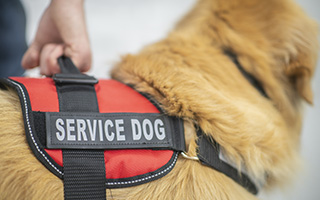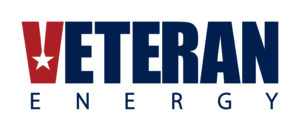
It’s a sadly common story when it comes to our returning veterans. Some come home having to overcome the challenges of a physical disability. Others return and struggle with PTSD. And many deal with both. Luckily, folks such as the people at Texas VFW and U.S. Veterans Service Dogs are teaming up to give those stories happy endings.
“The program was built for the Texas VFW,” said Cody Bellanger, CEO and director of training and client services at USVSD, “We have now over 80 dogs in program.”
These dogs are bred and trained to help veterans in need, Bellanger said. Some are equipped to help physically disabled veterans do laundry, open doors and get items out of refrigerators. They can also turn lights on and off and even “hand” a cashier a credit card and then bring back the receipt. Others are trained to help veterans cope with PTSD.
The first two graduates of the program, Labrador retrievers named Pearl and Polaris, were united with their veteran owners—Larry and Buddy—back in August. And Bellanger still checks in with them regularly.
“They’re doing very well,” he said.
Bellanger said one of the veterans often had so much anxiety he barely left his home before receiving his service dog.
“But now he gets out a couple of times a day,” he said. “It’s invaluable. You just can’t put a price tag on it.”
The dogs, usually Labrador and golden retrievers, are born and raised at a USVSD training facility, then sent to live with a host family for about a year, he said. They come back and get another six months or so of training, and then they’re partnered with a veteran.
And then the veterans, who go through an involved application process, get trained, too. Bellanger has trained dogs for years, and he said it’s one of the things that makes USVSD unique, making sure the new dog owners understand the potential of their new furry friends.
“We train these people as hard as we train the dogs,” he said. “We try to get people in the mindset: This dog is supposed to make your life easier. These dogs aren’t judging you. They’re full of unconditional love, and they want to help.”
But as helpful as these dogs are, bringing them up isn’t cheap. It can cost $35,000 to $40,000 to train a dog that’s able to help a disabled veteran. And it can cost $28,000 to $30,000 to train a dog equipped to help a veteran dealing with PTSD. But Bellanger said he can’t think of a group of people more deserving of assistance.
“At the end of the day, these are the men and women who went out and fought for us.”
At Veteran Energy, we’re proud supporters of the Texas VFW. And we’re excited about this new program. To learn more or to apply for a veteran service dog with USVSD, click here. To learn more about the Texas VFW, click here.


